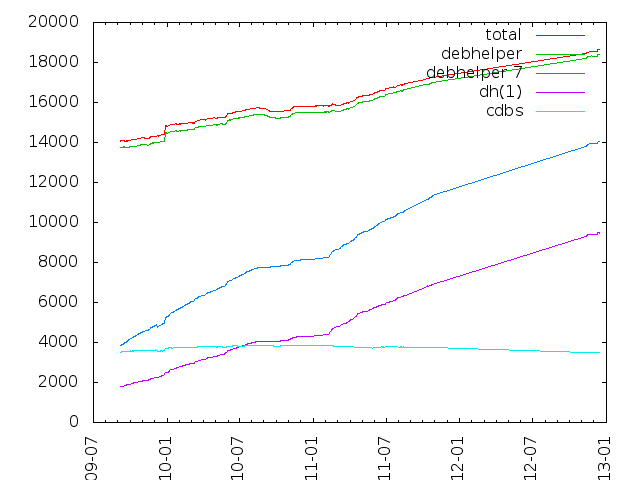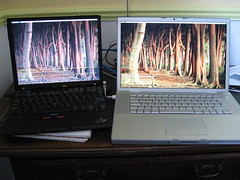
I've been a bit surprised by the strong positive response to my
previous post. People generally seemed to think it was quite non-ranty; maybe I should clean the rust off my flamethrower. :-) My hope was that I'd be able to persuade people to change some practices, so I guess that's a good thing.
Of course, there are many very smart people doing bug triage very well, and I don't want to impugn their fine work. Like its medical namesake, bug triage is a skilled discipline. While it's often repetitive, and there are lots of people showing up with similar symptoms, a triage nurse can really make a difference by spotting urgent cases, cleaning up some of the initial blood, and referring the patient quickly to a doctor for attention. Or, if a pattern of cases suddenly appears, a triage nurse might be able to warn of an incipient epidemic. [Note: I have no medical experience, so please excuse me if I'm talking crap here. :-)] The bug triagers who do this well are an absolute godsend; especially when they respond to repetitive tasks with tremendously useful pieces of automation like
bughelper. The cases I have trouble with are more like somebody showing up untrained, going through everyone in the waiting room, and telling each of them that they just need to go home, get some rest, and stop complaining so much. Sometimes of course they'll be right, but without taking the time to understand the problem they're probably going to do more harm than good.
Ian Jackson reminded me that it's worth mentioning the purpose of bug reports on free software: namely, to improve the software. The GNU Project has some
advice to maintainers on this. I think sometimes we stray into regarding bug reports more like support tickets. In that case it would be appropriate to focus on resolving each case as quickly as possible, if necessary by means of a workaround rather than by a software change, and only bother the developers when necessary. This is the wrong way to look at bug reports, though. The reason that we needed to set up a bug triage community in Ubuntu was that we had a relatively low developer-to-package ratio and a very high user-to-developer ratio, and we were getting a lot of bug reports that weren't fleshed out enough for a developer to investigate them without spending a lot of time in back-and-forth with the reporter, so a number of people volunteered to take care of the initial back-and-forth so that good clear bug reports could be handed over to developers. This is all well and good, and indeed I encouraged it because I was personally finding myself unable to keep up with incoming bugs and actually fix anything at the same time. Somewhere along the way, though, some people got the impression that what we wanted was a first-line support firewall to try to defend developers from users, which of course naturally leads to ideas such as closing wishlist bugs containing ideas because obviously those important developers wouldn't want to be bothered by them, and closing old bugs because clearly they must just be getting in developers' way. Let me be clear about this now: I absolutely appreciate help getting bug reports into a state where I can deal with them efficiently, but I do not want to be defended from my users! I don't have a basis from which to state that all developers feel the same way, but my guess is that most do.
Antti-Juhani Kaijanaho said he'd experienced most of these problems in Debian. I hadn't actually intended my post to go to Planet Debian - I'd forgotten that the "ubuntu" category on my blog goes there too, which generally I see as a feature, but if I'd remembered that I would have been a little clearer that I was talking about Ubuntu bug triage. If I had been talking about Debian bug triage I'd probably have emphasised different things. Nevertheless, it's interesting that at least one Debian (and non-Ubuntu) developer had experienced similar problems.
Justin Dugger mentions a practice of marking duplicate bugs invalid that he has problems with. I agree that this is suboptimal and try not to do it myself. That said, this is not something I object to to the same extent. Given that the purpose of bugs is to improve the software, the real goal is to be able to spend more time fixing bugs, not to get bugs into the ideal state when the underlying problem has already been solved. If it's a choice between somebody having to spend time tracking down the exact duplicate bug number versus fixing another bug, I know which I'd take. Obviously, when doing this, it's worth apologising that you weren't able to find the original bug number, and explaining what the user can do if they believe that you're mistaken (particularly if it's a bug that's believed to be fixed); the stock text people often use for this doesn't seem informative enough to me.
Sebastien Bacher commented that preferred bug triage practices differ among teams: for instance, the Ubuntu desktop team deals with packages that are very much to the forefront of users' attention and so get a lot of duplicate bugs. Indeed - and bug triagers who are working closely with the desktop team on this are almost certainly doing things the way the developers on the desktop team prefer, so I have no problem with that. The best advice I can give bug triagers is that their ultimate aim is to help developers, and so they should figure out which developers they need to work with and go and talk to them! That way, rather than duplicating work or being counterproductive, they can tailor their work to be most effective. Everybody wins.
 I've started the transition of parted 2.2 to unstable. This is a major update needed for sensible support of newer hard disks with alignment requirements different from the archaic cylinder alignment tradition. I posted to debian-boot with a summary of the partman changes involved.
I've started the transition of parted 2.2 to unstable. This is a major update needed for sensible support of newer hard disks with alignment requirements different from the archaic cylinder alignment tradition. I posted to debian-boot with a summary of the partman changes involved.
 Although dh is still a bit behind CDBS, the steady upward trend is quite striking - it looks set to break 20% soon, up from under 13% in September - compared with CDBS which has been sitting within half a percentage point of 25% the whole time.
Incidentally, was that an ftpmaster trying to sign his name in the graph over Christmas or something? :-)
Although dh is still a bit behind CDBS, the steady upward trend is quite striking - it looks set to break 20% soon, up from under 13% in September - compared with CDBS which has been sitting within half a percentage point of 25% the whole time.
Incidentally, was that an ftpmaster trying to sign his name in the graph over Christmas or something? :-)
 I would like to applaud
I would like to applaud 
 Continuing from where we
Continuing from where we  Thanks to Stefano Zacchiroli for doing the same for Debian bugs back in
July.
Thanks to Stefano Zacchiroli for doing the same for Debian bugs back in
July.
